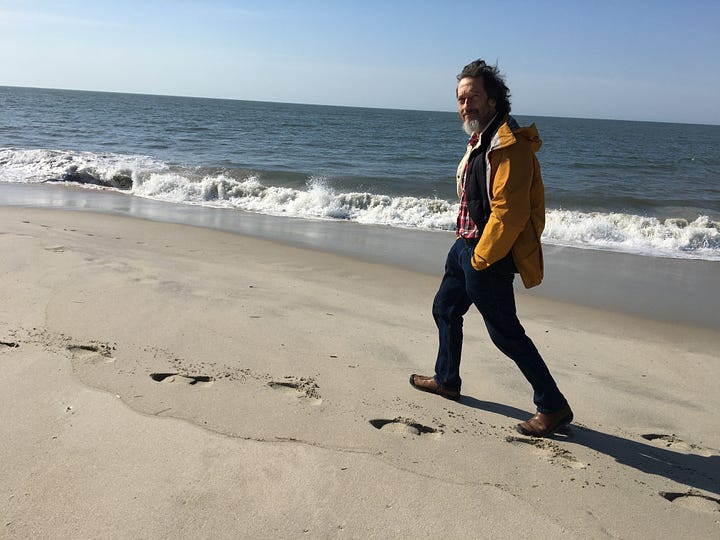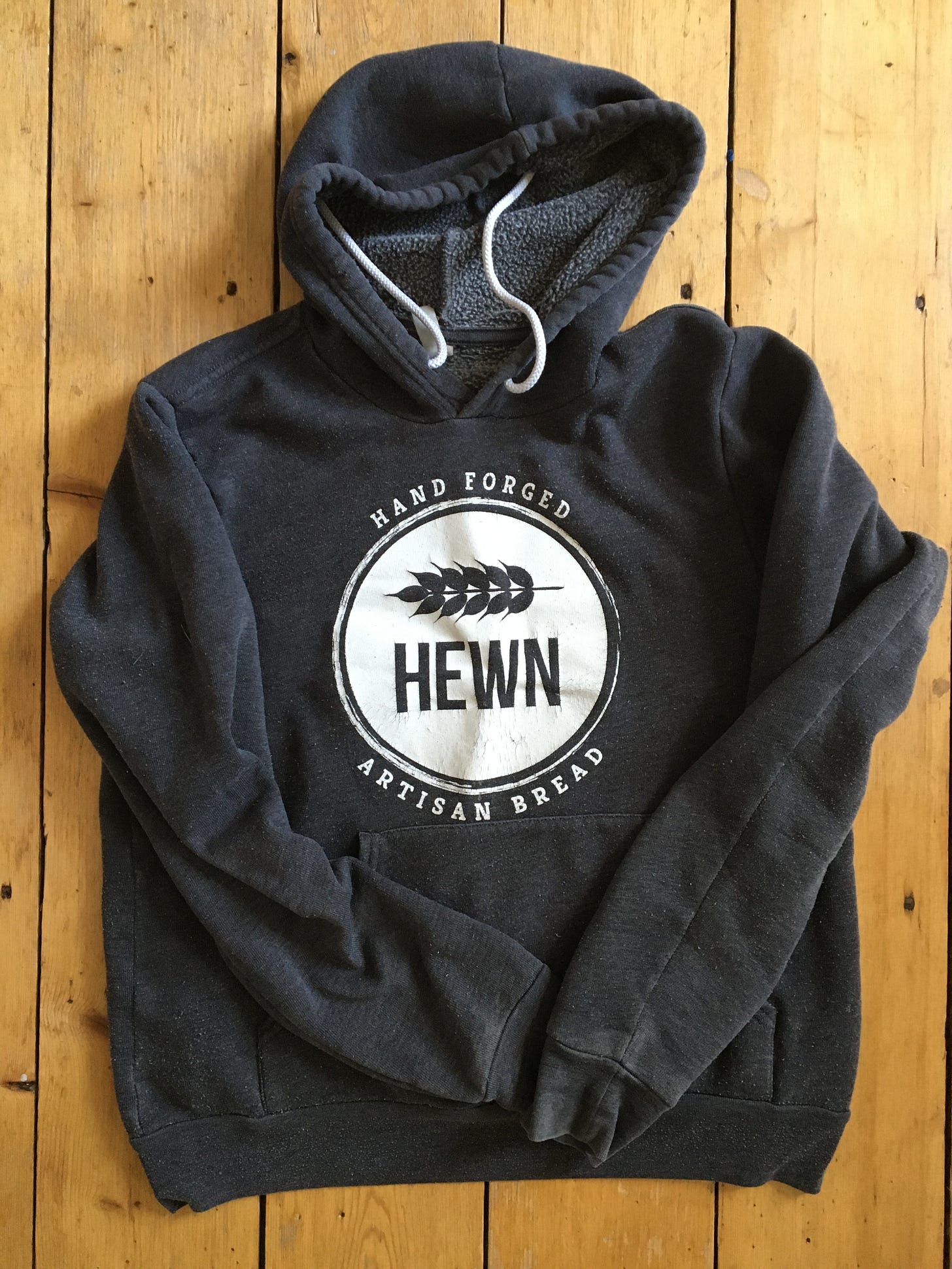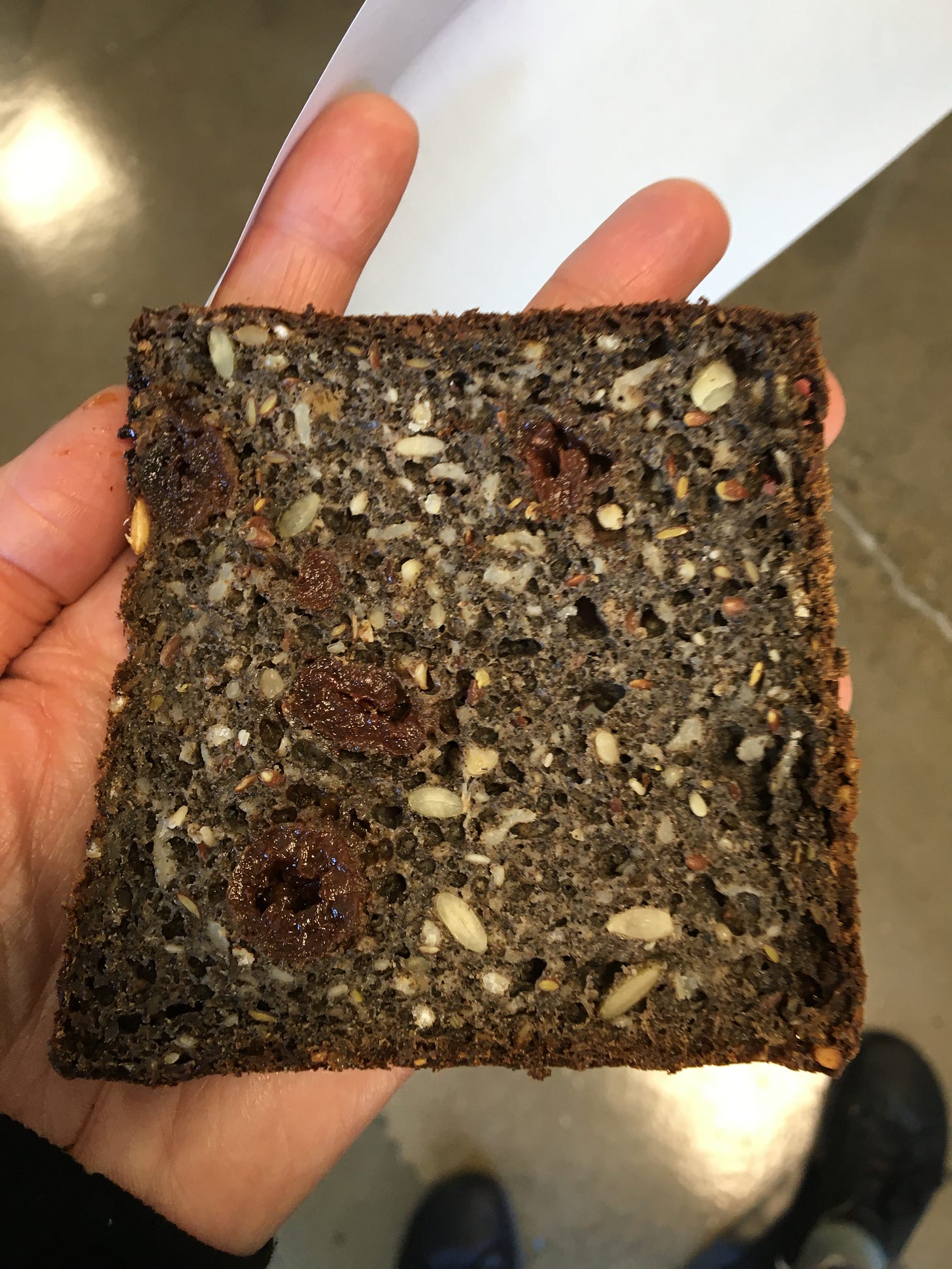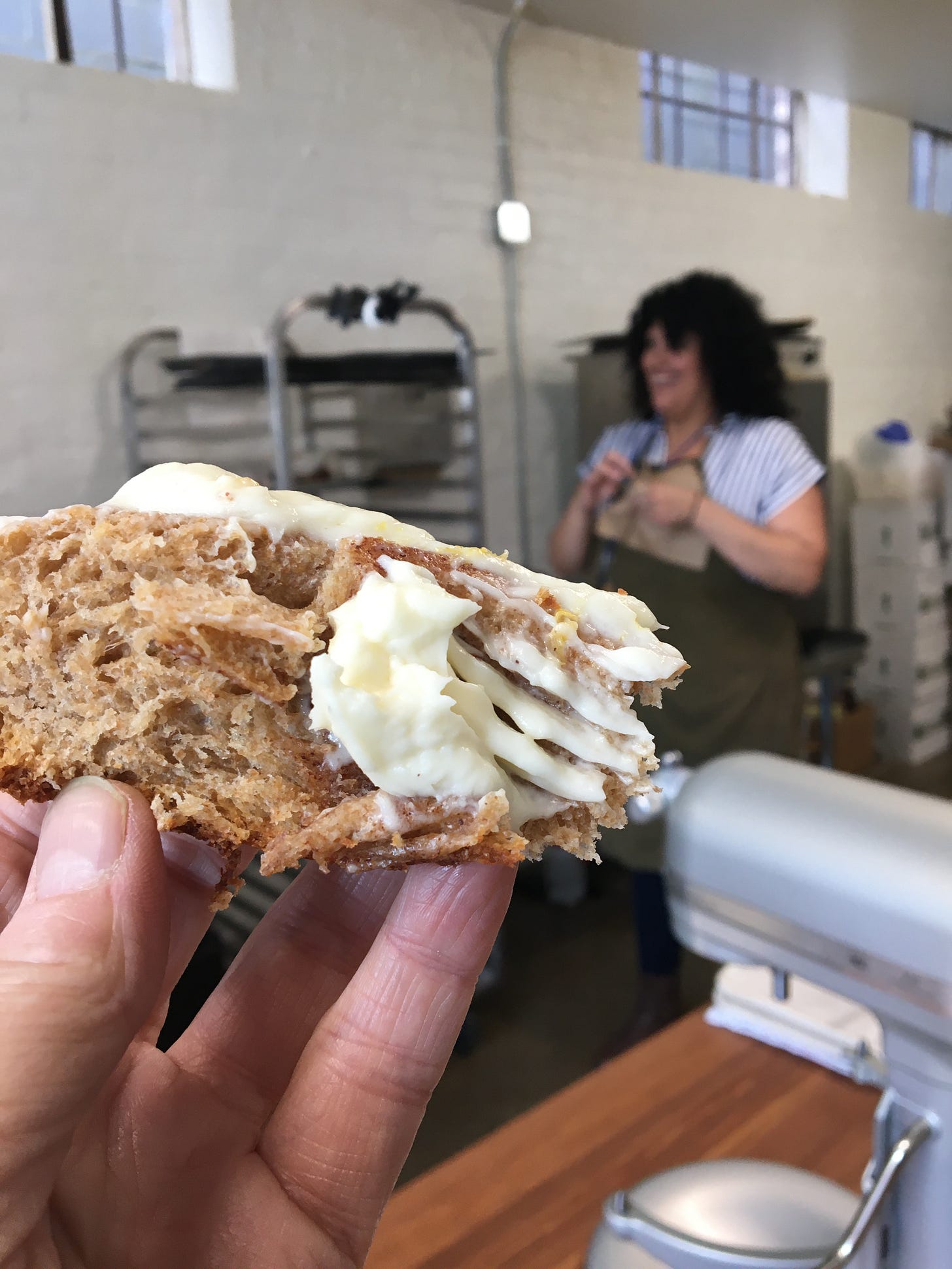Dear bread pals, I wanted to write you immediately after the bread fest but life intervened. Luckily, my feelings are really accessible, as close as my favorite sweatshirt.
This garment is from HEWN bakery in Evanston, Illinois. I knew Ellen King a while before I got to visit, so I was primed to be a fan.
“I’m not trying to sell you a loaf of bread, I’m selling you an organic farming system to bring the bread basket back to the Midwest.“ —Ellen King
Of course I was smitten with her work. HEWN, which she runs with Julie Matthei, sells bread, and superior treats, and also, flour and beans to help people get to know the grains introduced in their baked goods. The shops are engines for change, including in the way they run production. When I visited in 2019, every baker knew each step of the process, and the front of house staff understood how to explain the grains and the ideas behind them, should the conversation flow there.
No one from HEWN was in Asheville, but the affection I feel for them is what I feel for this bread fest, and it hugs me just as tight as my best-worn gray hoodie.
I’ve only been to Asheville three times, but the festival began in 2004, when bakers Steve Bardwell and Gail Lunsford decided that bakers in North Carolina should get to know each other. (They also wanted to meet Peter Reinhart, and they figured hosting an event would bring him — it did!) The baker connections became very useful as the global commodity crisis hit in 2008. Bakers had to absorb phenomenal increases in the price of their main ingredient, which sparked an interest in closing the gap between field and flour. Luckily, another element was working in their favor: suitable wheat varieties.
Seed varieties are suited to certain climates and soils, and can’t necessarily adapt to where they are planted. Wheat arrived in America with Europeans, and production consolidated into wheat belts from about 1850-1900. North Carolina farmers generally grow soft red wheat, often in rotation with corn, and soft wheats are commonly used for crackers, cookies and pastries — not bread.
Dr. David Marshall came to North Carolina from Texas A & M to be the USDA-ARS wheat breeder based in Raleigh. This move was inspired to create bread wheat varieties as a rotation for tobacco crops, and was a big deal. Public plant breeders are few, and to have a public wheat breeder in a state where wheat is not a dominant crop — well, that’s extraordinary. Dr. Marshall’s Uniform Bread Wheat Trials began in 2002, so once this group of bakers needed local grain, field tested varieties were in development, and about to be released for farming.


These Bread Fest bakers were keen on trying these wheats, and the idea for the flour mill began to grow. Jennifer Lapidus applied for grants, and put herself into making Carolina Ground flour mill, which opened in 2012. Serendipitously, the first mill is an Ostiroller, one that belonged to Alan Scott, the baker and oven builder who inspired a generation of wood fired, natural leavening bakers. Located in a mixed light industrial space, the mill was small and much of the grain had to be stored offsite. The physical setup was tight and tough on the millers’ — first Jennifer and then others — bodies, and so she sought new location.
I got to see the new warehouse in April. The site has room for mechanization that spares people many of the repetitious motions involved in transforming grain into flour. The grain and flour flow is more automated, minimizing how much actual handling of grain millers have to do. Adding a New American Stone Mill increased capacity. The building has a couple of kitchens for testing and classes (FUN!!), and a room for sales and small events.
During Bread Fest — which is now a fundraiser for more wheat research — I lurked at the tail-end of a class about gluten-free natural leavening taught by Brennan Johnson (check out his writing and recipes at Wandering Schoolhouse), and taste the extraordinary cinnamon rolls Grace Garay (Nomad Bakehouse, Orlando) made in her class. I talked about the history of factory bread, and helped Jen tell the story of the mill. I missed a ton of other classes and talks!
But, I heard an extraordinary panel talk about making good bakery workplaces led by the Bread Bakers Guild of America’s Karen Bornarth, and featuring the aforementioned Grace Garay, Susannah Gebhart (OWL Bakery, Asheville), Betsy Gonzalez (Osono Bread, Atlanta) and Jon McDonald (Weaver Street Market, Raleigh & more). Everyone had such smart things to say about creating sustainable workplaces and lives! I took notes and will be posting them later.
The next day was a class for professional bakers, and as an instructor, I got to attend. Blair Marvin of Elmore Mountain Bread and Martin Philip from King Arthur led a group of bakers through their approaches to The Bread Lab’s Approachable Loaf. Can’t tell you how much I loved being near these bakers, watching them learn about this way to make artisan bread more approachable & affordable. Make it more everyday for people who don’t have the I LOVE EVERY KIND OF BREAD mission.
Blair’s story really appeals to me — she had sworn she’d never use pans or slice bread, but when her son was getting flak over his excellent non-sandwichy shaped bread, she went on a mission to get her bread into his classmate’s hands. Now she makes 200 tinned loaves a week, and sells them at the supermarket & small grocers, alongside her ‘less approachable’ loaves. And her son and his classmates all have matchy-matchy bread. Bliss.
One of the last magnificent moments in Asheville was getting to meet Bonnie Ohara of Alchemy Bread. She came all the way from California, and hearing about her next book, and the time she had at the festival with other cottage bakers, ooh, that was grand.
Well, there you have it. I hope I’ve carried you back to my trip, and that you now want to visit all these bakers.
Yours, Amy
Resources:
Bake Adrian Hale’s Communal Bread, her version of The Approachable Loaf. This is my daily bread.
Listen to Ellen King’s talk for the Culinary Historians of Chicago.
Check out Carolina Ground through their website, and be sure to look at SOUTHERN GROUND, Jennifer Lapidus’ book that tells a much longer version of the Asheville Bread Festival’s story. And has excellent recipes by bakers who use this flour!







I miss you, Amy, and cherish our yearly visit to NC. 🌾💛🍞
Nice reflections Amy. Can you tell us more about the buckwheat oat cherry seed bread? The slice looks amazing!